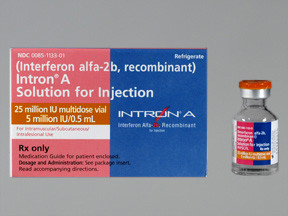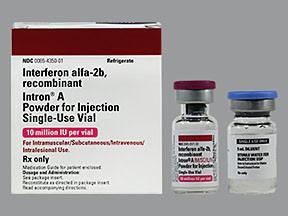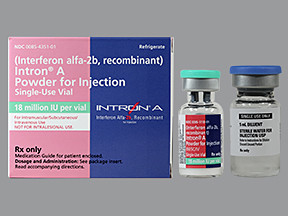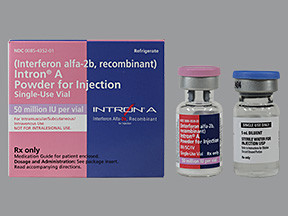INTERFERON ALFA - INJECTION
PHONETIC PRONUNCIATION: (in-ter-FEER-on AL-fuh)
COMMON BRAND NAME(S): Alferon N, Intron A, Roferon-A
GENERIC NAME(S): interferon alfa-2b,recomb.
Uses
USES: This medication is used to treat various cancers (e.g., leukemia, melanoma, AIDS-related Kaposi's sarcoma). It is also used to treat virus infections (e.g., chronic hepatitis B, chronic hepatitis C, condylomata acuminata). This medication is the same as a protein that your body naturally produces (interferon). In the body, it is thought to work by affecting cell function/growth and the body's natural defenses (immune system) in many ways. Adding more interferon may help your body fight off cancer or virus infections.
How to use INTERFERON ALFA - INJECTION
HOW TO USE: Read the Medication Guide available from your pharmacist before you start using this drug and each time you get a refill. Learn all preparation and usage instructions given by the manufacturer. If you have any questions, consult your doctor or pharmacist. This medication is given by injection into a muscle or under the skin as directed by your doctor. Rotate the injection site each time you inject this medication to prevent soreness. It may also be given by injection into a vein or directly into a lesion, usually by a health care professional. If you are giving this medication to yourself at home, learn all preparation and usage instructions from your health care professional. Do not shake the medication container (vial or syringe). Doing so may decrease the effectiveness of the drug. Before using, check this product visually for particles or discoloration. If either is present, do not use the liquid. Learn how to store and discard medical supplies safely. Never reuse single-use syringes or needles. It is okay to reuse the multidose pen. It is best used in the evening before bedtime to reduce side effects. Drink plenty of fluids while using this medication unless otherwise directed by your doctor. Dosage is based on your medical condition and response to therapy. Do not change the dose or how often you use this medication without your doctor's approval. Use this medication regularly to get the most benefit from it. To help you remember, use it at the same time each evening that you have a scheduled dose. Different brands of interferon alfa can result in different amounts of medication in the blood. This medication comes in different forms (a powder in a vial, a solution in a vial, and a multidose pen). The way you inject this medication depends on the form you are using. Follow your doctor's directions carefully. Do not switch brands without your doctor's permission.
Side Effects
Precautions
Interactions
Overdose
Images
Reviews
Faq for INTERFERON ALFA - INJECTION
- Interferon alfa-injection is used to treat certain types of cancer, such as leukemia, melanoma, and certain types of hepatitis.
- Interferon alfa-injection works by boosting the body's immune system to help fight against cancer cells or viruses.
- Interferon alfa-injection is given as an injection under the skin or into a muscle. The frequency and dosage will be determined by your healthcare provider.
- Common side effects of Interferon alfa-injection include flu-like symptoms (such as fever, chills, and headache), fatigue, loss of appetite, nausea, and injection site reactions.
- It is generally not recommended to use Interferon alfa-injection during pregnancy or while breastfeeding. It is important to discuss with your healthcare provider regarding the potential risks and benefits.
- Interferon alfa-injection may cause or worsen certain medical conditions, and it can interact with other medications. It is important to inform your healthcare provider about any existing medical conditions or medications you are taking.
- Treatment duration with Interferon alfa-injection can vary depending on the specific condition being treated. It may be given for several months or even years.
- Interferon alfa-injection can help control or shrink certain types of cancer, but it is not considered a cure. It is typically used as part of a comprehensive treatment plan that may include surgery, radiation therapy, or other medications.
- Interferon alfa-injection may be prescribed to children for certain conditions, such as pediatric leukemia or hepatitis. The dosage and safety will be determined by a pediatric specialist.
Warning
WARNING: This medication can rarely cause or worsen serious (rarely fatal) medical conditions, including mental/mood conditions (e.g., depression), immune system problems (autoimmune conditions such as lupus or rheumatoid arthritis), circulation problems, or infections. If your medical history includes any of these conditions, tell your doctor promptly. Also, tell your doctor right away if any serious symptoms or side effects occur (see Side Effects section). This medication may be combined with ribavirin to treat chronic hepatitis C. Ribavirin may cause harm to an unborn baby or death. Women must avoid pregnancy while they or their male partners are using ribavirin. Ribavirin may cause a blood disorder (hemolytic anemia), which can worsen heart disease. If you are using this medication with ribavirin to treat chronic hepatitis C, also carefully read the drug information for ribavirin.
Disclaimer
IMPORTANT: HOW TO USE THIS INFORMATION: This is a summary and does NOT have all possible information about this product. This information does not assure that this product is safe, effective, or appropriate for you. This information is not individual medical advice and does not substitute for the advice of your health care professional. Always ask your health care professional for complete information about this product and your specific health needs.






No Reviews Yet